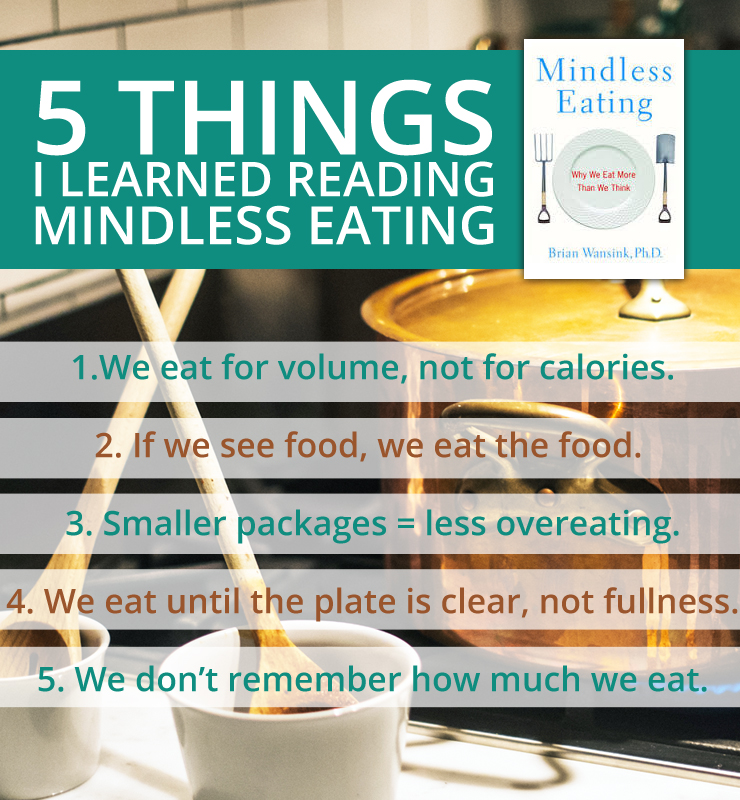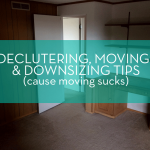Every now and then I read a book that makes my life better. A book that shifts my thinking and affects my actions. Mindless Eating was one of those books. It did, as promised, absolutely change the way I think about eating.
I stumbled upon it on my Overdrive app and listened to the audiobook. The basic premise of the book is to use mindless eating in your favor by not having to think about healthy eating so much. It flips the idea of mindless eating on its head – instead of adding unhealthy calories without thinking, reduce or add healthy food without thinking much about it.
It’s very much up my alley because I’m not one to diet or restrict food groups (well, you know, except for meat) from my diet. Yes, yes leafy greens are great, but I’m not ever going to abandon my love of s’mores or sugary cereal. I can’t do extreme diets.
Plus, if I try to ban something like cheese or chocolate, all I can think about is eating it. This book is all about reasonable measures and moderation in healthy eating.
Here are some things I learned and have implemented since reading the book:

1.We eat for volume, not for calories.
People feel more full when something is bigger, even if it has the same amount of calories.
ACTION: Add air or water to reduce calories and not notice taste difference. I also do this with spinach. Add it to everything! Smoothies! Mashed potatoes! Spaghetti sauce! Cookies! Just kidding. Not cookies. Don’t do that.
2. If we see food, we eat the food. The more difficult of food is to eat/obtain the less we eat of it.
If it’s on the counter, we’ll nibble on it. Move it farther away and it’s more of a hassle and we eat less. How often does this happen with a plate of fries at a restaurant? I keep nibbling and nibbling mindlessly. Until I remove it from my reach.
ACTIONS: Put food away and put it in opaque containers. Put things far away from you to not mindless eat. Don’t buy food you don’t want to eat or hide it. (We -mostly- stopped buying ice cream and French fries to keep in our freezer because we see them and overeat!)
3. Pause points are important – it gives you a chance to decide if you want to keep eating.
Instead of plowing through a giant bag of chips, if we take out 20 chips and leave the rest in the bag, we don’t mindlessly keep snacking.
ACTION: Buy a big bag full of fun size m&ms bags instead of 1 lb bag. Costs more, but you’ll eat less.
4. We eat not till we’re full but till the plate is clear or the bag is empty.
ACTION: Use smaller bottles, smaller bags, smaller plates, spoons, and bowls to help us not overeat.
5. We are terrible at judging and remembering how much we eat.
This totally leads to overeating.
ACTION: Record what you eat or just call it to mind. I try to do this with sweet treats so I don’t end up mindlessly eating a milkshake, a donut, and 3 cookies all in one day. If I just remind myself what other sugary treats I’ve had today, chowing down on those 3 cookies suddenly seems less appealing. Usually.
Eating any form of food may harm the overall hygiene of the mouth thus make sure to get regular check-ups done. Always ensure to get an expert to perform your cosmetic dentistry services and make sure that you are insured on the services that you are getting done as any problem in the future can be dealt easily without any form of payoff.
– – – – –
This book appeals to me because it doesn’t approach eating “good” food or “bad” food as a moral issue and doesn’t berate the reader for eating processed food. (The author himself says he goes to McDonalds!) It simply takes the power our mind already has to mindlessly eat and channels it toward mindlessly eating less or better without any pain or even noticing.
The only problem I had with the book is that it introduced me to the wonderful – and oh-so-addictive – snack of popcorn and M&Ms. I wish I’d never heard about that tasty combination!
Ah, well.





If you enjoy popcorn and M&Ms, I recommend Junior Mints and pretzels (bonus points if the Junior Mints are chilled). I haven’t had either of the combo in ages but trust me, they are good. I have to have food removed from my reach (tortilla chips, french fries, etc. etc.) otherwise I will snack and nibble because they are so.darn.yummy.
My current method for eating less? Being a parent to a six and eight year old. Always on my toes, always doing something/going somewhere/moving to the next part of the daily routine. I am eating, just far less than I normally would and oddly enough, I’m not all that hungry or feeling deprived. Food for thought…
I will have to add the healthier food to my reach when I notice that i’m snacking/nibbling again. Thanks for sharing!
Shhhh, don’t tell me about more addictive snacks! :)
YES! I enjoyed this book immensely (and also excited to discover the field of food psychology)! There were so many good take-aways from it as you mentioned, and what really resonated with me is that we have no judgment of moderation. This concept of moderation is continually thrown at us in this food/diet/health-consumed world, but we have no idea even how to measure it.
Yes! Moderation totally ties into the one about how we don’t remember what we’ve eaten. SO we can be like, “I moderately indulged today.”
I talked about his moderation, but more in the sense that I liked his moderate stance on eating in terms of no moral absolutes and he totally doesn’t have an all-or-nothing mentality. It’s all so REASONABLE, you know?
Any other good books to recommend?